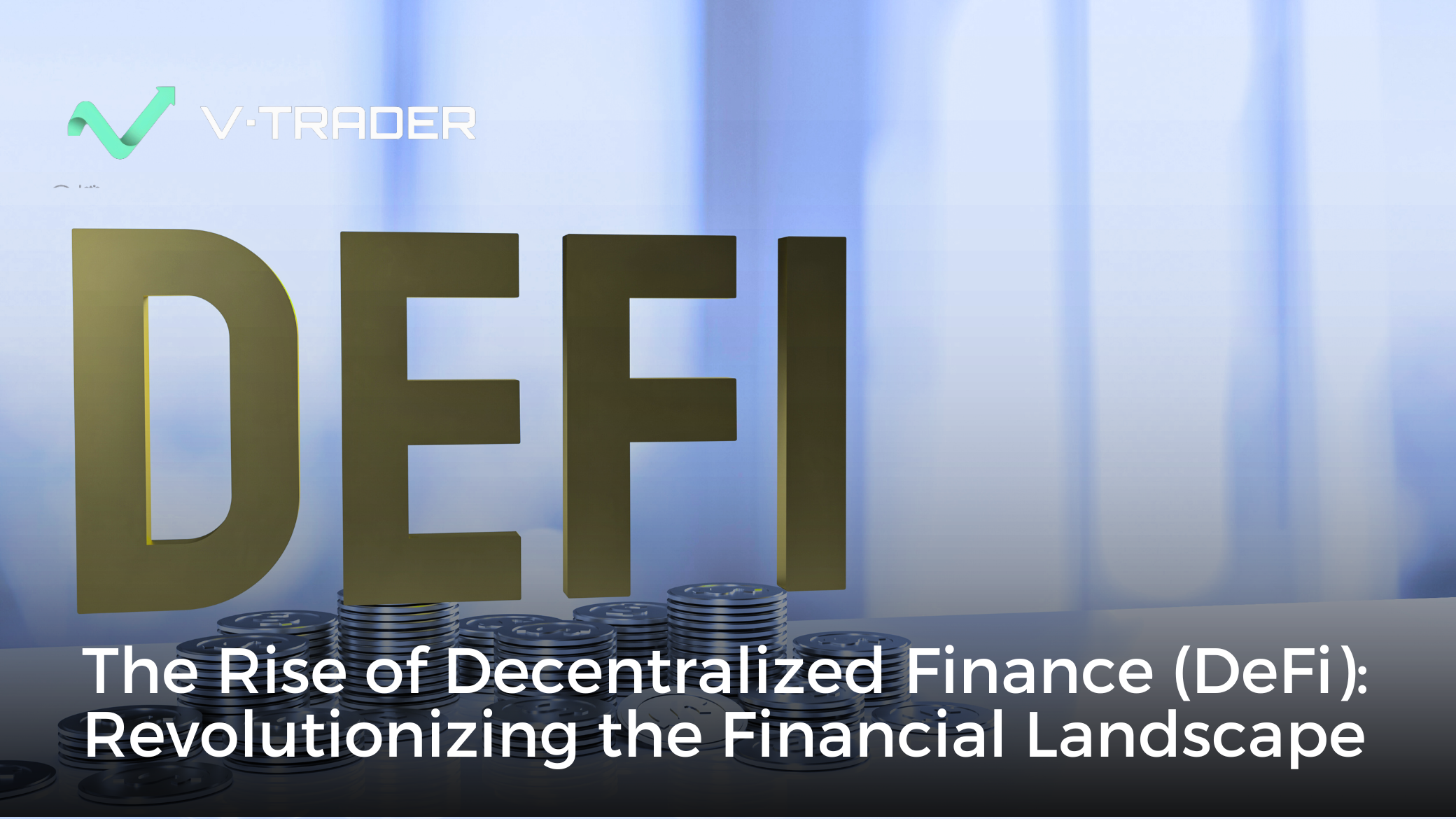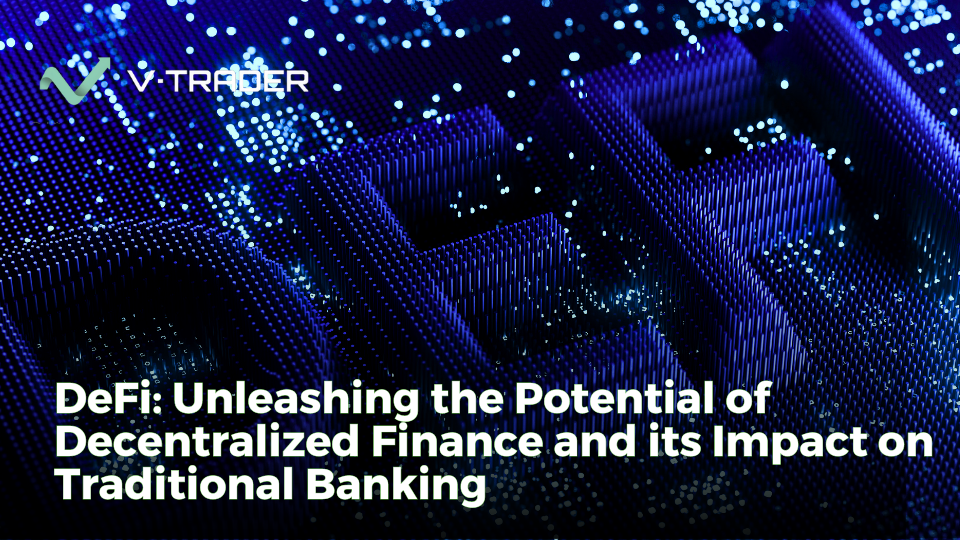Decentralized Finance (DeFi) has emerged as one of the most transformative and promising developments in the world of cryptocurrencies and blockchain technology. DeFi represents a paradigm shift in the way we perceive and interact with traditional financial services. As it continues to gain momentum, investors are taking note of the vast potential and opportunities that DeFi presents.
In this article, we explore the rise of DeFi, its key components, and the implications it holds for the future of finance.
Trade Your Crypto on vTrader Today – Download The vTrader App on Your iPhone
Understanding DeFi: Redefining Finance with Decentralization
DeFi refers to a new ecosystem of financial applications built on decentralized blockchain networks, primarily Ethereum. The core principle of DeFi is to remove intermediaries and offer financial services in a trustless, transparent, and permissionless manner. Smart contracts, self-executing code on the blockchain, play a central role in enabling these financial services without the need for traditional intermediaries like banks or financial institutions.
Key Components of DeFi
1. Decentralized Exchanges (DEXs): DEXs enable peer-to-peer trading of cryptocurrencies without the need for a central authority to hold users’ funds. These platforms facilitate direct asset swaps, enhancing security and user control.
2. Decentralized Lending and Borrowing Protocols: DeFi allows individuals to lend or borrow cryptocurrencies without going through a bank. Smart contracts determine interest rates, collateral requirements, and automate the lending process.
3. Stablecoins: Stablecoins are cryptocurrencies pegged to stable assets like fiat currencies or commodities, designed to minimize price volatility. They facilitate DeFi transactions without exposure to the wild price swings typical of other cryptocurrencies.
4. Yield Farming and Liquidity Mining: These are mechanisms that incentivize users to participate in DeFi platforms by offering rewards, often in the form of native tokens, for providing liquidity or staking their assets.
5. Decentralized Insurance: DeFi projects are exploring ways to offer insurance services through smart contracts, allowing users to protect their assets against specific risks without traditional insurance companies.
6. Synthetic Assets: DeFi platforms enable the creation and trading of synthetic assets, representing real-world assets like stocks or commodities, and providing exposure to traditional financial markets.
The Promise and Challenges of DeFi
The rise of DeFi presents numerous opportunities and potential benefits:
1. Financial Inclusion: DeFi opens up access to financial services for the unbanked and underbanked populations, enabling participation in the global economy.
2. Accessibility: Anyone with an internet connection can access DeFi services, without relying on geographic proximity or traditional financial infrastructure.
3. Transparency: DeFi operates on public blockchains, providing unparalleled transparency as all transactions are visible on the blockchain.
However, DeFi also faces several challenges:
1. Security: Smart contract vulnerabilities and hacks remain a concern in the DeFi space. Auditing and improving the security of smart contracts is critical.
2. Regulatory Landscape: The DeFi ecosystem is evolving rapidly, and regulators are still navigating how to approach and regulate these decentralized financial services.
3. User Experience: DeFi platforms often require users to be familiar with blockchain technology, which can be a barrier for mainstream adoption.
Trade Your Crypto on vTrader Today – Download The vTrader App on Your Android
The Future of Finance is Decentralized
DeFi is disrupting traditional finance by providing more efficient, open, and inclusive financial services. As the ecosystem matures, it has the potential to reshape the global financial landscape. Investors are paying attention to the growth of DeFi projects, and the sector continues to attract significant investment and innovation.
As DeFi expands and addresses its challenges, it will likely become an integral part of the broader financial ecosystem. Investors who embrace the opportunities and risks of DeFi may find themselves at the forefront of a revolutionary transformation in the way we conduct financial transactions and access financial services. The future of finance is undoubtedly decentralized, and DeFi is leading the way.
Stay informed with the latest crypto news and insights delivered directly to your email inbox by subscribing to our free newsletter at the right bottom of this page.
Looking for even more timely updates? Join us on Telegram for the fastest access to our news.
Written by Agbo Obinnaya
Check out our Ethereum Gas Fee App on App Store.
Check out our Ethereum Gas Fee App on Play Store.
Join the conversation on Twitter: Click here.
For media inquiries or interviews, please get in touch with us here.
About vTrader News:
vTrader News is a renowned international platform with comprehensive cryptocurrency, business, finance, technology, and entrepreneurship coverage.
With a global readership, vTrader News provides unparalleled insights into the latest developments shaping the world of cryptocurrency, finance, and other emerging industries.
Learn More About vTrader: Click here.

Steve Gregory is a lawyer in the United States who specializes in licensing for cryptocurrency companies and products. Steve began his career as an attorney in 2015 but made the switch to working in cryptocurrency full time shortly after joining the original team at Gemini Trust Company, an early cryptocurrency exchange based in New York City. Steve then joined CEX.io and was able to launch their regulated US-based cryptocurrency. Steve then went on to become the CEO at currency.com when he ran for four years and was able to lead currency.com to being fully acquired in 2025.




Hello. impressive job. I did not imagine this. This is a excellent story. Thanks!
Thank you!